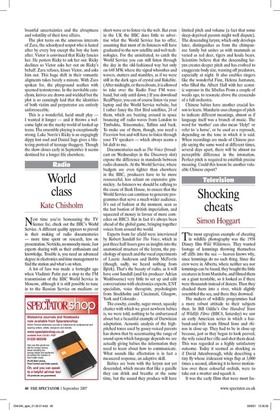World class
Kate Chisholm Next time you're bemoaning the TV licence fee, check out the BBC's World Service. A different quality appears to prevail in their making of radio documentaries — more time spent on research, less on presentation. No tricks, no smoochy music. Just experts sharing with us their enthusiasm and knowledge. Trouble is, you need an advanced degree in electronics and time management to find the station and what's on when.
A lot of fuss was made a fortnight ago when Vladimir Putin put a stop to the FM transmission of the BBC World Service in Moscow, although it is still possible to tune in to the Russian Service on mediumor short-wave or to listen via the web. But even in the UK the BBC does little to advertise what the World Service has to offer, assuming that most of its listeners will have graduated to the new satellite and web technologies. For the uninitiated, to catch the World Service you can still listen through the day in the old-fashioned way but only on 648 MW, where the signal whooshes and wavers, stutters and stumbles, as if we were still in the dark ages of crystal and Bakelite. (After midnight, or thereabouts, it is allowed to take over the Radio Four FM waveband, but only until dawn.) If you download RealPlayer, you can of course listen via your laptop and the World Service website, but I rather fancy the Hot Bird satellites, 24 of them, which are buzzing around in space bouncing off radio waves from London to Timbuktu, Trincomalee, Tallinn and back. To make use of them, though, you need a Freeview box and will have to listen through your TV speakers — which always seems a bit daft to me.
Documentaries such as The Voice (broadcast on Wednesdays in the Discovery slot) expose the difference in standards between radio channels. At the World Service, where budgets are even tighter than elsewhere in the BBC, producers have to be more resourceful, less reliant on expensive gimmickry. As listeners we should be rallying to the cause of Bush House, to ensure that the World Service can continue to generate programmes that serve a much wider audience. It's out of fashion at the moment, seen as the last bastion of British imperialism, and squeezed of money in favour of more comedies on BBC3. But in fact it's always been ahead of the global game, bringing together voices from around the world.
Experts from far afield were interviewed by Robert Sandall for The Voice, which in just three half-hours gave us insights into the anatomical structure of the larynx, the psychology of speech and the vocal experiments of Laurie Anderson and Bobby McFerrin (though, sadly, we heard nothing from Bjork). That's the beauty of radio, as it will have cost Sandall (and his producer Adrian Washbourne) very little to set up and edit conversations with electronics experts, ENT specialists, voice therapists, psychologists from Stockholm and Cincinnati, Glasgow, York and Colorado.
The coochy, coochy, sugar-sweet, squeaky chatter with which we greet newborn babies is, we were told, nothing to be embarrassed about but a beautiful example of Darwinian adaptation. Acoustic analysis of the highpitched tones used by gooey-voiced parents has shown that by accentuating the range of sound upon which language depends we are actually giving babies the information they need to learn about how to communicate. What sounds like affectation is in fact a measured response, an adaptive skill.
Babies are born with the larynx not yet descended, which means that like a gazelle they can drink and breathe at the same time, but the sound they produce will have limited pitch and volume (a fact that some sleep-deprived parents might well dispute). The descending larynx, which only develops later, distinguishes us from the chimpanzee family but unites us with mammals as varied as red deer, tigers and koala bears. Scientists believe that the descending larynx creates deeper pitch and has evolved to exaggerate body size, warning off predators, especially at night. It also enables singers like the wonderful Finn, Helena Juntunen, who filled the Albert Hall with her ecstatic soprano in the Sibelius Prom a couple of weeks ago, to resonate above the crescendo of a full orchestra.
Chinese babies have another crucial lesson to learn. Mandarin uses changes of pitch to indicate different meanings, almost as if language itself was a branch of music. The word for 'mother' can also mean 'Help!' or refer to 'a horse', or be used as a reproach, depending on the tone in which it is said. When recordings are made of Chinese people saying the same word at different times, several days apart, there will be almost no perceptible difference in the intonation. Perfect pitch is required to establish precise meaning. Could this lesson be another valuable Chinese export?







































 Previous page
Previous page